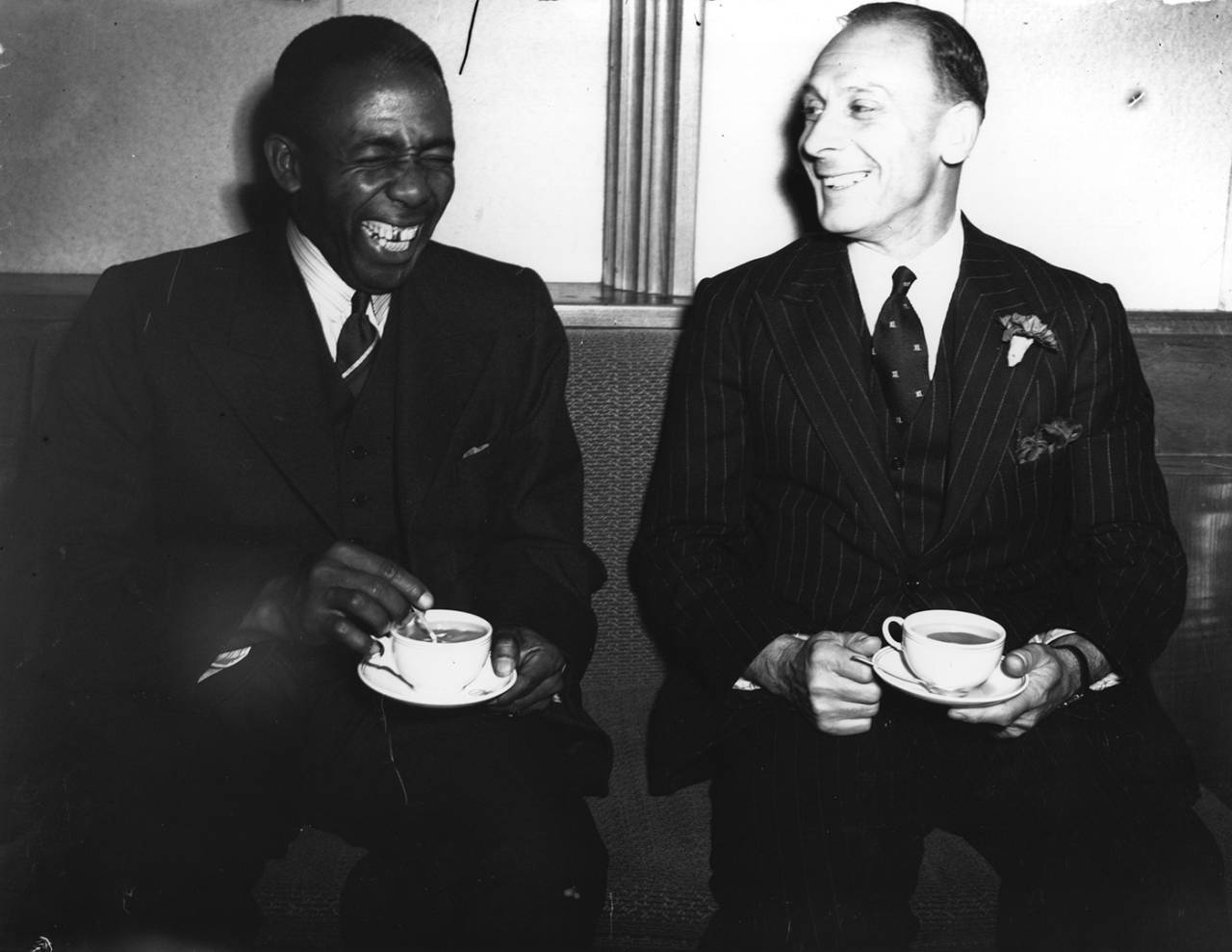A colossus named Connie
Learie Constantine's influence on life and cricket in the West Indies and in his adopted home, England, went far beyond his deeds on the field
Alan Gardner
09-Sep-2017

Constantine with Jack Hobbs at a reception for the West Indies team in London in 1939 • Getty Images
West Indian cricket has probably long grown tired of being reminded of its glorious past, which is why the current team's famous win at Headingley this year was such a tonic to players and followers alike. From having their fitness for Test cricket questioned they were suddenly conquering heroes, able to travel to Lord's for what few expected to be a series decider, in the hope of making some more history of their own.
It is 67 years since those "two little pals" of Lord Beginner, Sonny Ramadhin and Alf Valentine, spun West Indies to their first victory in England on the same ground; 22 years before that, they made their Test bow, also at Lord's, only to be beaten by an innings. Those early tours more closely resembled West Indies' recent fortunes in England - where they did not win a Test between 2000 and 2017 - but the struggle for recognition was more profound. Three heavy defeats in 1928 left Wisden to question whether they had been elevated to Test status too soon.
What was not in dispute was the talent of one man: Learie Constantine. His Test record as an allrounder may seem unspectacular, with 58 wickets at 30.10 and a batting average below 20, but in other respects he was a colossus. An important figure in the fight for West Indian self-rule, he helped break down some of the racial barriers that affected life for black people in Britain, his adopted home, during the middle of the 20th century, and went on to receive a knighthood and serve at a different Lords - the House of Lords - as the first black peer. That's without touching on his time as a legend of the Lancashire League.
Constantine - or "Connie", as he was affectionately known - was a T20 hitter before the idea was conceived, as well as a formidable fast bowler and extrovert fielder, perhaps second only to Bradman as one of the sensations of the age. But he was pragmatic about how cricket could help him advance in life, using his natural ability and showman's skills on that 1928 tour to win a contract as a professional with Nelson, a small town in Lancashire where he spent nine English summers during the prime of his career, becoming one of the highest-paid sportsmen in Britain.
It is when charting Constantine's time in this northern cloth-manufacturing community that Harry Pearson's new biography of the man really comes to life. When Constantine arrived, he became a local hero - there is now a blue plaque commemorating the house where he lived - and star attraction in Lancashire cricket, drawing record crowds to Nelson's Seedhill ground and on trips to rivals such as Bacup, Rawtenstall and Colne. (More than 50 years later, Viv Richards would briefly tread a similar path with Rishton.)
If it seems strange that a player of Constantine's ability would choose to commit himself to club cricket (albeit as a professional), sometimes at the expense of representing his country, it is important to remember the context of being a black West Indian in the 1920s and '30s. As Pearson writes: "The West Indies was a divided society, and white people ruled it."
Players were often selected for the national team on the basis of which island was hosting a touring side, and the captain was by default always a white man - though Constantine stepped in to help guide West Indies to a series-sealing victory in Jamaica on England's 1934-35 tour, when Jackie Grant went off injured. Perhaps ironically, it was in the tight-knit, white working-class environment of Nelson that Constantine could leave such indignities behind. "It was a little world all to itself, drawing strength from its parochialism. Here, Connie noted approvingly, 'a cricketer is just a cricketer and nothing else'."

Little, Brown
Incidentally the Lancashire League - and equivalents such as the Bradford League, where Constantine ended his professional career - seems to have been a sort of proto-IPL (without the cheerleaders and global TV audience), attracting the likes of SF Barnes, Hedley Verity, Ted McDonald, George Headley and Lala Amarnath for what could be highly lucrative stints well away from the world of Test cricket. Things change, things stay the same.
Constantine was a man of strong principles (he held an eight-year grudge against Wally Hammond for a perceived snub on England's 1925 visit), though his demeanour could sometimes be taken for arrogance and he struggled to adapt to life back in Trinidad after going into politics. He was, as CLR James noted in Beyond a Boundary, a beacon for West Indian cricketers in their fight for recognition, but his most significant legacy may have been as an advocate of Caribbean independence, as well as in improving race relations in the UK. "The country we live in would be a much diminished place had he stayed in Trinidad," writes Pearson.
There are times when Connie slips into rather mundane Test match reportage, and it is a shame that Pearson - a noted humourist - appears somewhat constrained in his writing about a historical figure of such gravity. But this is an excellently researched and sensitively handled account of Constantine's life and impact beyond the game. He was "a 'Champagne cocktail' cricketer - effervescent but with a kick" and half a century on, his story has lost none of its fizz.
Connie: The marvellous life of Learie Constantine
By Harry Pearson
Little, Brown
£20, 352 pages
By Harry Pearson
Little, Brown
£20, 352 pages
Alan Gardner is an assistant editor at ESPNcricinfo. @alanroderick